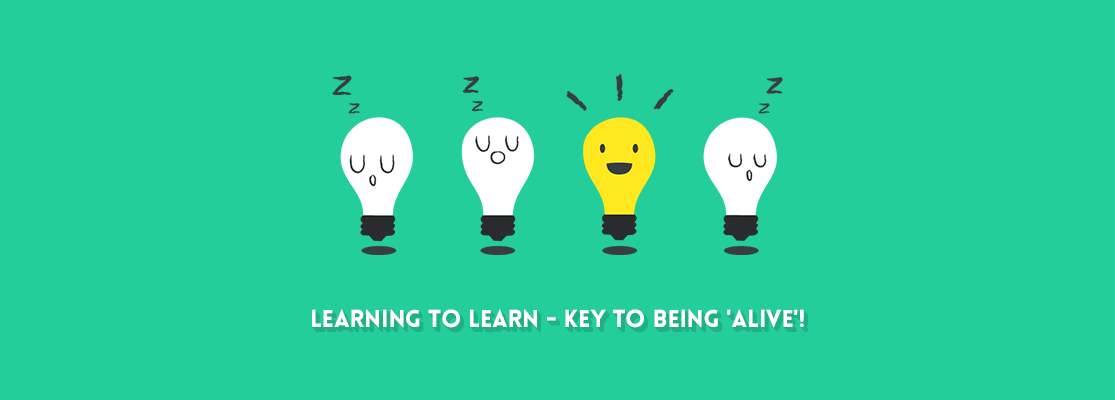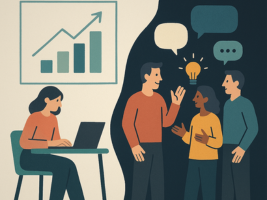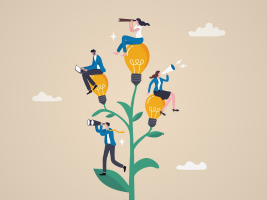LEARNING TO LEARN – KEY TO BEING ‘ALIVE’!
Arun Pradhan is currently developing an app entitled Learn2Learn which will support people to learn faster, smarter & deeper in the real world. It delivers the latest thinking on neuroscience and evidence-based learning. It also helps in exploring how to maximise experiential and social learning.
As part of his research involves exploring ‘real world’ learning stories, I got an invite to answer four important questions. And, I did with great pleasure, being happy about playing a tiny part in the research. Here they are, my responses.
Q1. In your working life, how have you learned effectively from experience, please provide an example if possible? (e.g. how have you used intentional practice, learned from failure, learned from ambitious projects and/or used reflection)
My response: I think – on hindsight – that I should consider myself lucky for having been ‘arrogant’ in CHOOSING my experiences myself. Because the learnings I got this way were easy to handle, though the process of ‘choosing’ (with its repercussions) was quite thorny. To explain a bit, I gave up a promising career because I found I wasn’t enjoying it. But, my being clear about what I did NOT want to do wasn’t enough. I had to ‘discover’ what I WANTED to do. So, I started my intentional practice of questing after what I would enjoy doing. This first ever ‘searching’ experience of mine brought in loads of reflections which, to this day, have stayed with me.
Then happened a series of discoveries… journalistic photography, dance photography, production design, advertising, and now e-learning (with Learnnovators). As I mentioned, the very experience of discovering things that I love doing has been truly enriching. It’s almost spiritual.
Q2. In your working life, how have you learned effectively from people, please provide an example if possible? (e.g. how have you learned from project teams, mentors, coaches and/or broader social networks)
My response: When one chooses UNKNOWN TERRAINS to explore possibilities of DISCOVERING things, one also truly feels the need for GUIDANCE. My case was no different.
J Krishnamurti, the philosopher, became my mentor. By throwing light on the deepest realms of the subconscious mind, he helped me reflect on my thoughts because they were majorly tumultuous and volatile. Obviously. But, thanks to JK, I subsequently started enjoying the mind’s turbulence, because it was indicative of the ‘great inner struggle’ to go forward.
Then came Rauf, my philosopher friend and godfather, who ‘saw’ a photographer in me. He pushed me into the profession in a way I enjoyed the ‘fall’. He told me, “If you want to be a photographer, listen to a lot of music and read lots of books”. These words left an indelible ‘scar’ in my psyche.
Now, I have Ravi Pratap Singh, who’s a great source of inspiration for me. We invest a lot of our time discussing matters pertaining to mind, people, intentions, attitude, perceptions, perspectives, perseverance, and a whole lot of things that help us keep ourselves on the right track in as far as our understanding and approach to our work and life go. This is one hell of a life-time learning for me.
Q3. In your working life, how have you learned effectively from courses, research or investigation, please provide an example if possible? (e.g. how have you learned from reading on the web, reading books or attending conferences/courses)
My response: We’re in a digital world today. There’s so much information not just lying around but flooding around us. We pick and choose what’s immediately relevant for us and try to assimilate the essence of whatever little we imbibe. For me, the current phase of my life is awesomely rewarding because I’m coming to know how much I DON’T KNOW. That’s enlightenment because this knowledge is what goads me to go forward.
Q4. What’s your top advice for someone who wishes to develop faster and learn complex skills in modern workplaces?
My response: Be OPEN. ‘Cause, it’s only that way fresh knowledge comes in… faster. Be ADAPTIVE. ‘Cause, things are transitioning around us constantly. If we are not willing to adapt, we will soon go obsolete. For, extinct goes the species that refuses to adapt. Resist being JUDGEMENTAL. ‘Cause, it makes you opinionated and prejudiced. And, it blocks fresh inputs from coming in. Cultivate the habit to be AVARICIOUS for knowledge. ‘Cause, there’s a constant danger of its staying away from us, because we just don’t have time for it amidst the chaotic schedule we have every day. Remember, constant replenishment of knowledge is key to staying ‘alive’.
Written by Nirmal Ranganathan
(Senior Learning Designer at Learnnovators)
_________________________________
Published on 04-Oct-2016






